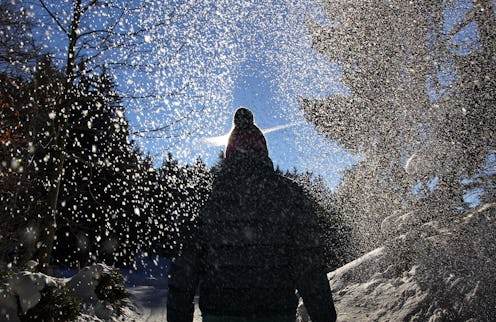News
5 Amazingly Feminist Holiday Traditions
Sunday marked the first day of Hanukkah, which means the winter holiday season has officially begun. Over the next several weeks, people in countries all around the world will be reflecting on the end of the year and celebrating the beginning of a new one. Each religion and culture has its own distinct holiday traditions to celebrate whatever symbols are important to its people, and while some of this tradition can get lost in the business and spending spree of the season, this time of year is an opportunity to reflect on what's important in our lives and our cultures. Although some have been distorted over the years, many of these holiday traditions have feminist backgrounds that are both interesting and empowering.
Despite the commercialization of the holiday season and the unfortunate idea of holiday traditions sometimes being "women's work," feminism plays an important role in many holidays. Holiday traditions that honor women are especially important because during a time when the whole community comes together to celebrate, people need to be reminded of the power and contributions of women throughout history. And of course, feminism is one more thing to be thankful for during your holiday. Check out these holiday traditions that have cool feminist origins.
Cheese Latkes
Other than being unbelievably delicious, latkes have a fascinating feminist history. Tori Avey, a Jewish food blogger, detailed the amazing history of Judith, a Jewish warrior, in a blog post for PBS.
The custom of eating dairy foods for Hanukkah dates back to the Middle Ages, when the Book of Judith played an important role in the Hanukkah narrative. Judith was a celebrated Jewish heroine who saved her village from an invading Assyrian army. A beautiful widow, she plied the Assyrian army’s general Holofernes with wine and salty cheese. When the general passed out drunk, Judith beheaded him with his own sword. The Israelites launched a surprise attack on the leaderless Assyrian army and emerged victorious. In Judith’s honor, we eat dairy foods during Hanukkah.
St. Lucia's Day
A beloved Swedish holiday, St. Lucia's Day is celebrated on December 13, both to honor the Winter Solstice and commemorate the Roman Christian martyr who died in 304 AD. Girls in communities all across Sweden are chosen to wear the crown of candles and visit hospitals and retirement homes, delivering ginger snap biscuits called "pepparkakor."
Christmas Trees
The symbol has arguably become a bit distorted now, but the popularization of the Christmas tree definitely had a feminist spin. Christmas trees were a pagan tradition in Germany that was incorporated into Christianity in the Middle Ages. In 1848, Queen Victoria of England encouraged her German husband Prince Albert to put up a tree in their house, just as he had done when he was a child. That year, homes throughout England featured the Christmas tree as the latest fashion, and there was a Christmas tree in the White House less than 50 years later. So essentially, one woman made Christmas trees popular all over the world.
Kukumbuka
Kwanzaa was first established in 1966 by Dr. Mualena Karenga as a Pan-African celebration of cultural history. Because it's a relatively new holiday, it has the added benefit of a more direct incorporation of feminism into the tradition. On the sixth day of Kwanzaa, family and friends gather for a karamu feast to celebrate creativity, and during the kukumbuka, a man, woman, and child each share their reflections of the past year. The equality between the genders is an important stipulation of the celebration and is an integral part of the holiday tradition.
Santa Claus
Long before he was the jolly, round-bellied, ubiquitous man he is known as today, St. Nick was a Christian bishop who lived during the 4th century in modern-day Turkey. Legend says he came from a wealthy family, but gave up his fortune to help the poor, and one day, he dropped a sack of gold out his window to save a young girl from being bought into slavery. The gold landed in a stocking, and as word of the miracle spread, children began to hang stockings by their fireplaces in hopes of receiving a gift from Santa. Even way back then, Santa knew how to be an ally.
Many of these traditions and histories are under-appreciated, and it's important to remember them this holiday season. Women have been the proud carriers of tradition in nearly every culture in the world, and honoring them should be an important part of all our holidays this year.
